In Case of Emergency
Perspectivas de la gestión extensiva de crisis
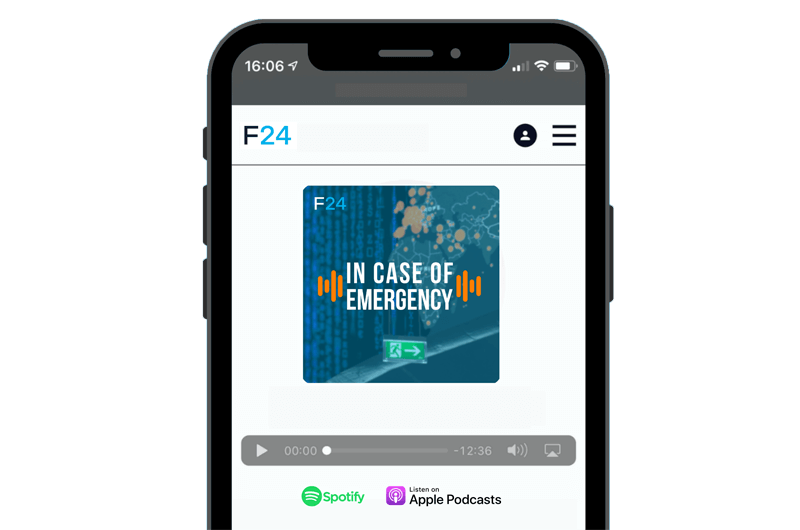
Creemos que es importante compartir información, aprendizajes y mejores prácticas. Por eso hemos creado “In Case of Emergency”, un podcast en inglés sobre la gestión de crisis y las notificaciones de emergencia. Es su fuente de información valiosa sobre la continuidad del negocio, la respuesta a las emergencias, las alertas públicas y mucho más.
John Davison, el presentador de este podcast, entrevista a expertos internacionales y profesionales en sus respectivos campos para compartir diferentes experiencias, consejos e información valiosa sobre diversos aspectos de la gestión de incidentes y crisis.
John dirige F-24 UK Ltd. y las operaciones generales de F24 en Londres con pasión y dedicación, impulsando el éxito de los productos de F24 para la gestión de alertas y crisis a escala internacional.
Sus perspicaces debates y charlas con expertos de todo el mundo también están disponibles en Spotify o Apple Podcast (Sólo en inglés).



John Davison, Managing Director F-24 UK Ltd.
New Episode
Episode 40: Risk Radar – Navigating Crisis with Analysis & Insight (Part II)

Markus Epner & John Davison
En la segunda parte del episodio, John conversa con:
Markus Epner, Director de la Academia de F24 AG. Markus posee una amplia experiencia en seguridad y gestión de crisis. Sirvió como oficial de las Fuerzas Especiales durante las guerras de Bosnia y Kosovo y trabajó en puestos directivos en el sector empresarial durante más de dos décadas, principalmente en Lufthansa y Boehringer Ingelheim. Markus es licenciado en Seguridad y Gestión de Crisis por la Universidad de Kiel y en Estudios de Seguridad y Crisis por la Escuela Superior de Administración Policial de Schleswig-Holstein.
02:40: Just reading the risk reports isn’t enough, if you haven’t adjusted yours processes, your crisis management plans, yours BCM plans, you haven’t finished the job
06:10 Can you remember our first podcast episode together, where we spoke about virtual crisis management… the pros and cons of it?
08:41 London Stansted airport hosted the F24 Aviation Day this year and they gave a particularly impressive presentation on operational resilience and how they use F24’s CIM
To access the insights from the F24 Aviation Experience Day in London, click here: F24 Aviation Experience Day – F24
Todos los episodios del Podcast de un vistazo (English Only):

Marianne Brokjøb de Equinor
Episode 1: Train hard, fight easy – but why is it important to train and exercise?
En este episodio, exploramos la importancia de la formación y obtenemos una visión más detallada de los retos a los que se enfrentan las grandes empresas, así como los posibles programas de formación y consejos.
2:11 Why is it essential to train and exercise, when there are well documented processes that have been well prepared?
6:13 What are the typical challenges that you face when training an exercising? What about a large company with many different geographic locations?
7:20 How about scenarios, what do you typically exercise during your training programs?
Episode 2: Certainty during insecure times: Efficient mass notifications with acknowledgements – what does that look like in practice?
Dos de nuestros compañeros de F24 comentan los diferentes casos de uso de la alerta masiva en Alemania y España/Latinoamérica y describen ejemplos de éxito reales. Además, ofrecen consejos relacionados con la alerta masiva.
1:34 For which user cases or situations is mass alerting recommended?
2:46 In your opinion what are beneficial functionalities linked to alerting a large number of persons? (e.g. international alerting)
7:27 In terms of past incidents can provide some examples of notable past incident where mass notifications proved to be so successful.


Eske Ofner de F24 AG y Juan Manuel Gil de F24 Servicios de Comunicación S.L.U.

Martin Stamm de A3M
Episode 3: Safe travels: Keeping employees safe during work-related travels can be a significant challenge, which is why professional and real time risk monitoring is a must – but how?
En esta charla, comentaremos el impacto que ha tenido la COVID-19 en los viajes de los empleados, y los cambios y recomendaciones sobre seguridad en viajes, así como el seguimiento del riesgo en el futuro próximo.
1:52 How can a software help organisation to keep their employees safe when travelling?
3:25 How did COVID-19 impact risk monitoring and employee travel?
6:32 What is your recommendation and main aspects to consider in the near future in regards to employee travel safety?
8:10 Are there any other aspects that would benefit a business when it comes to monitoring global risk?
Episode 4: Digital task management – how to bring your plans to life?
Obtén información sobre las ventajas de la gestión digital de tareas, como parte de la gestión de crisis, y sobre los aspectos y requisitos más importantes en la práctica.
1:32 What would you describe to be the most important aspect of crisis management?
3:40 What are the benefits of digital task management and what requirements are necessary? (e.g. checklists)
7:47 Can you recite recent examples of where one of your customers really exceled in using FACT24 CIM to deal with a critical situation?
10:03 What is your view in terms of operational resilience v crisis management, should organisations keep a clean line between day-to-day operations and real crisis incidents?

Kristian Pettersen de F24 Nordics AS

Dr. Sabine Schnabel, LL.M. (NYU), fundador y director general de BSH advisors
Episode 5: The role of compliance in crisis management – why is it an important aspect to integrate?
Este debate sobre cumplimiento en situaciones de crisis ofrece ejemplos de crisis que interfieren con el importante papel del cumplimiento. Además, da recomendaciones sobre cómo integrar las políticas de cumplimiento en la gestión de crisis.
1:51 Why is it important for compliance leaders to be part of crisis management?
5:05 What challenges do compliances teams face in crisis situations, can you give us some examples?
8:17 How would you recommend integrating compliance policies into crisis management?
Episode 6: Reliable Information – how do you organise effective communication for a crisis situation?
Este episodio pone de relieve la comunicación satisfactoria en situaciones de crisis, basándose en ejemplos recientes. Además, nuestro invitado, experto en comunicación, nos brinda algunas recomendaciones adicionales sobre cómo enfocar la comunicación en las crisis.
1:45 Is there a secret miracle solution to successful crisis communications?
4:50 Can you recite some recent crisis situations that were handled particularly well or perhaps even badly in terms of communication?
7:02 What about the saying “say nothing to no-one” approach when should such an approach be adopted if at all?

Prof. Dr. Stefanie Heinecke de Fresenius

Benjamin Jansen de F24 AG
Episode 7: Comprehensive crisis management – So let’s now look at the future of F24: what does it look like?
En este episodio, ofreceremos un análisis más detallado sobre F24, como proveedor líder en Europa para la gestión de crisis e incidentes, y qué ha cambiado durante la pandemia acontecida durante el último año. Por otro lado, hablaremos sobre la importancia de la asistencia técnica en situaciones cruciales.
1:44 Tell us more about F24 the leading European solution provider in emergency notifications and crisis management?
3:30 How can technology assist organisations in managing crisis situations?
5:35 How has F24’s focus changed in the last year during the global pandemic crisis?
Episode 8: Enhancing Reputation through Crisis – how does effective media management work?
John Davison and Peter Barrett discuss the most important aspects of reputational management and why good media mangement can help to improve your reputation or even lead to invisible crisis for the public eye. Illustrated by remembering real examples of the past like the UK horse meat scandal or the Ratners Jewel PR crisis.
2:01:30 Could you give a quick introduction to Powerscourt and your role?
02:50 In regards to your experience, can you recite any example of good reputational crisis incidents that were managed successfully with the particular eye to the media management topic?
7:20 What are some challenging attributes to crisis management compared to business as usual?
10:18 It’s not so much the big impact, that you’re talking about, but something relatively slow burning and if it’s not dealt with it could turn into something bigger?
12:16 Do you remember Gerald Ratner’s example of a PR crisis?
14:27 What have you learned by working in your profession that you may have adopted as a standard working practice or perhaps which you even use in your personal life?

Peter Barrett from Powerscourt
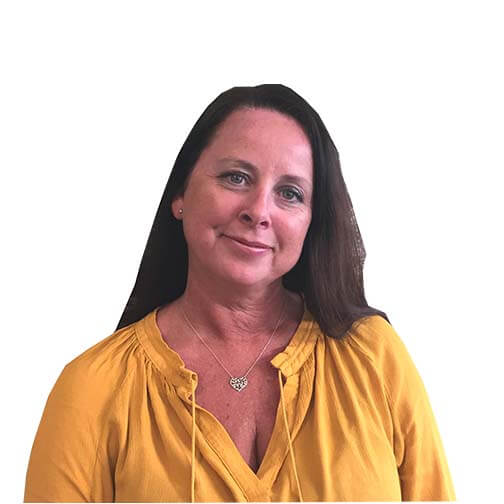
Carol Mackenzie, Group Head of Crisis Management and Business Continuity from TUI
Episode 9: Real-time Overview- Is task management the digital “Open Line”?
In this episode you’ll gain a deeper insight into how digital task management supports globally working organisation like the TUI Group. The interview with Carol Mackenzie also highlights the advantages and changes digital task management during the last years of the pandemic. Furthermore, the example of Hurricane Irma is used to illustrate the agility and abilities digital taks management offers.
2:16 From your crisis management experience, what are the key insights into practical use of task management for an organization when managing an emergency event or a data crisis event?
5:15 Over the past couple of years their have been some incidents that maybe raised the profile within TUI to bring together your teams. How was that handled during covid and with people working remote?
6:56 Can you recite any examples of where task management proofs to be crucial in certain situations?
9:40 Do you think there is a secret formula to ensure employees have a clear overview of crisis and can you provide a good example of it?
13:30 What have you learned by working in your profession that you may have adopted as a standard working practice or perhaps which you even use in your personal life?
Episode 10: Championing Business Continuity – What can we derive from research?
Rachael Elliott, Head of Thought Leadership at the BCI talks about the challenges and developments she has observed in years of researching in the field of Resilience. This episode deals with the upcoming scientific insights of the BCI for 2022 and the possible change that will occur in Business Continuity and Resilience. You will also gain a deeper inside into the latest Report on Emergency and Crisis Communications.
1:48 What is the BCI and what is the work like as a researcher?
4:12 Do you think there are any aspects of BC or CM that need more attention or may need more attention in the future?
6:24 You are talking to a lot of experts, industry professionals and organizations that have the challenging topic of being resilient. Do you have any particular observations or takeaways from somebody’s interviews maybe a reoccurring theme?
9:10 You mentioned earlier the Emergency and Crisis Management Report. In regard to that particular report, do you have any tips for the professionals listening based on some of the insights that have been gained?
12:16 Do you remember Gerald Ratner’s example of a PR crisis?
13:55 What have you learned by working in your profession that you may have adopted as a standard working practice or perhaps which you even use in your personal life?

Rachael Elliot Head of Thought Leadership
at the Business Continuity Institute
Luigi Martino, Head of the Center for Cyber Security and International Relations Study at University of Florence
Episode 11: Cyber Security and the human factor – a global challenge or individualistic?
Listening to this episode, you`ll attend an interesting conversation with Luigi Martino, Professor and Head of the Center for Cyber Security and International Relations at the University of Florence. He’s sharing his insights of working within the Global Commission on Stability of the Cyberspace and the importance of global cooperation in the field of Cyber Security. Furthermore, the challenges of secure IT systems in times of remote working and the human factor of cyber attacks are addressed.
2:09 You are a member of the Global Commission on the Stability of Cyber Space. Could you tell us a little bit more about that roll and what it is about?
6:30 What can organisations do, to minimize that particular risk?
7:44 Would that be Phishing Mails?
10:56 So Cyber Security is about people, it is about the individuals and about their awareness?
11:47 I know one of your current research focuses on a slightly different aspect of Cyber Security. Not for organisations, but about the overarching correlation of Cyber as a Space and indeed Outer Space. Tell us a little bit more.
16:10 What have you learned by working in your profession that you may have adopted as a standard working practice or perhaps which you even use in your personal life?
Episode 12: Informing Persons of concern – What are the important aspects of disaster response?
By discussing the sensitive topic of disaster response, this episode examines the importance of correct person of concern management. Abigail Pollard shares her experience in the aviation industry and outlines challenges in working internationally as well as the
2:17 Tell us a little bit about Blake Emergency Services, what do you do?
4:51 What can you share with us from your experience on how to best organise such a process?
9:15 How do you capture these critical/sensitive information?
10:56 What is the biggest challenge in terms of disaster response for organisations?
14:38 What have you learned by working in your profession that you may have adopted as a standard working practice or perhaps which you even use in your personal life?

Abigail Pollard, Managing Director at Blake Emergency Services

Markus Epner Head of Academy at F24
Episode 13: Virtual crisis management- a chance or problematic?
In this episode, you’ll gain a deeper inside on the field of crisis management. Speaking from his own experiences, Markus Epner talks about the changes that working remote brought to the field of crisis management. He outlines the advantages in managing a crisis virtual, but also shows the multiple challenges that this “new” form of crisis management poses.
2:04 Speaking from your experience, how has that change of working life (working remotely) impacted organisations, and how should they handle incidents and crisis events?
6:20 How would you define virtual crisis management?
7:28 Can you share any potential challenges or obstacles that might arise from a virtual work environment?
11:30 What about the future? Where do you see the new way of virtual crisis management going in future?
12:50 What have you learned by working in your profession that you may have adopted as a standard working practice or perhaps which you even use in your personal life?
Episode 14: Organizational Cyber Security – a Challenge to be mastered?
Eli Westad Garmann, talks about the need for testing and running cyber security incident response plans and what to consider in this context. She gives some great tips on what cyber security measures an organisation must include in a plan and shares her experience of important aspects that are sometimes overlooked in the early stages of planning, e.g. during purchasing a new digital software.
2:02 How can organizations protect themselves from the rising risk of cyber attacks and what role does testing and running incident response plans have to play?
5:07 What do you recommend organizations should do in regards to cyber security incident response plans?
5:52 How do you suggest organization to prevent the risk during such an incident?
7:52 Would you still typically recommend organizations to do a deeper dive beyond just the certification, or would you say the certification has kind of a security in the knowledge that an organization is well-prepared for the threat of information security?
8:57 From your experience Eli what would you offer as a best practice or alternate recommendations that you can share with us ?
10:03 What have you learned by working in your profession that you may have adopted as a standard working practice or perhaps which you even use in your personal life?
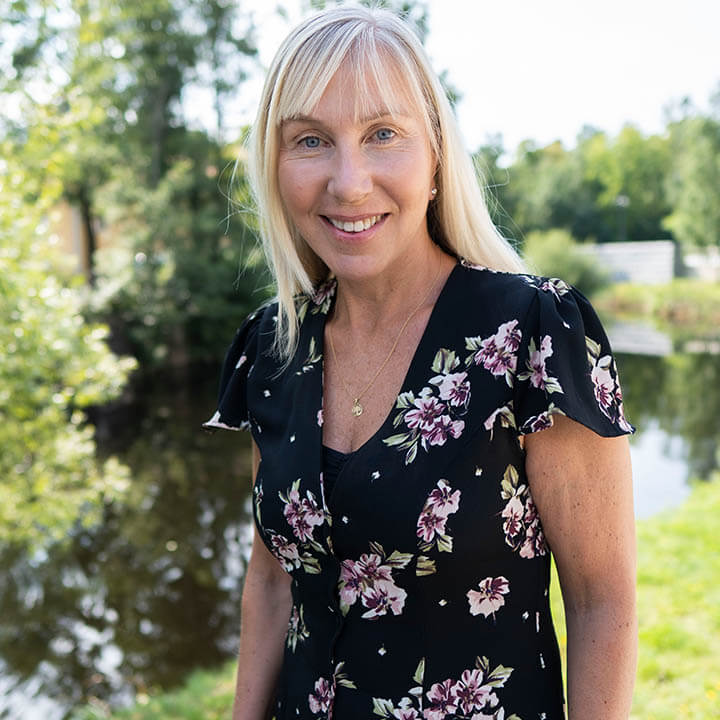
Eli Westad Garmann, Group Lead Cyber Security at Advansia

Jerry Allan, Director and Co-Founder CrisisVR
Episode 15: Empowering the front line – the key to a successful response plan?
Con sus muchos años de experiencia, Jerry Allan, director y cofundador de CrisisVR, comparte sus conocimientos sobre cómo preparar a su personal operativo para hacer frente a una situación inesperada y al impacto de acontecimientos ambiguos. A la vez que destaca la importancia de capacitar a la primera línea, detalla las habilidades necesarias y los aspectos clave de un plan de respuesta exitoso.
1:51 When an incident occurs and the first responders have to work together with the emergency services, what challengeges arise and how can the resulting problems be prevented?
04:08 How do you collaborate in terms of a multitude of stakeholders, how do you bring all players into the same exercise?
06:09 What about the internal communication between the departements, especially between the strategic crisis management team and the operational front line. Can you recommend any basic strategies, perhaps concepts on how to set up the ideal process for all parties?
09:04 How would you suggest to really prepare the front line to deal with a really unexcepted crisis?
11:25 Going back to those simulations, how can you best put those plans into practices? Unannounced simulations or pre-planned simultations?
13:30 What have you learned by working in your profession that you may have adopted as a standard working practice or perhaps which you even use in your personal life?
Episode 16: Public warning systems – How do they contribute to public safety?
En este episodio, Amélie Grangeat le introduce en el campo de los sistemas de alerta pública. Nos da una visión general de la funcionalidad, el marco legal pero también de los retos, por ejemplo, ¿cómo advertir a la gente sin acceso a dispositivos técnicos?
2:13 Why is a public warning system so essential, and how is it applied around the globe?
4:10 And who would typically operate a public warning system and how does it work
5:35 How does it work ? How does everybody get that communication?
7:31 What is your experience of utilizing public warning systems within the lifecycle of a crisis, do you have any example where such a system really has proven itself in protecting lives?
9:31 How can you be certain that you reach everybody that needs to be alerted, in particular the old or young? How flexible is the system to go beyond reaching only to people with mobile phones?
12:25 What have you learned by working in your profession that you may have adopted as a standard working practice or perhaps which you even use in your personal life?

Dr. Amélie Grangeat, Senior Product Manager and Expert on public warning systems at F24

Nana Kalandarishvili, Manager at PWC and Expert in Geopolitics and Security
Episode 17: Geopolitical awakening of Corporate Security – a step towards crisis preparedness
Nana Kalandarishvili comparte sus conocimientos sobre el tema de los conflictos geopolíticos y la buena gobernanza. Habla del impacto de los conflictos geopolíticos en las empresas y su bienestar. También da una idea de cómo las empresas pueden prepararse para los grandes conflictos geopolíticos.
01:43 Are cooperations able to prepare for the geopolitical crisis and their effect effectively?
02:26 How do companies have access to the expertise in geopolitical risks, it seems quite a specialist field?
04:43 Do you think it needs a dedactive role responsible for that on the security risk team?
06:55 What geopolitical scenarios do you foresee in the future? And how do you see this typical scenarious impacting different business sectors?
09:41 What are the key aspects to pay attention to for security professionals to prepare themselves for the best possible crisis management for the future?
11:41 What have you learned in your profession that you may have adopted in your own standard working practice or in your personal life?
Episode 18: Training Teams for trauma Response – Dealing with the aftermaths of a crisis
Brian Power comparte sus conocimientos adquiridos a lo largo de más de 40 años de experiencia como responsable de formación especializada en la policía británica de transportes y la forma en que se enfrentó a dramáticas situaciones de crisis que afectaron a vidas e individuos y a quienes respondieron a los incidentes.
02:14 What are the differences between loss, trauma and the crisis?
04:00 What are the key recommendations that you would give to organisations on how they can be better prepared and making their teams more capable of handling traumatic crisis events?
5:45 What would you recommend being the most important aspect to consider for those responders when having to relay such tragic news?
08:40 Do you have any examples of perhaps some very well executive or perhaps some very poor executive communication in any of the work you have been?
12:10 What you may have learned in your profession that you may have adopted in your own business life or perhaps in your own personal life.

Brian Power, Crime Training Manager, British Transport Police

Episode 19: The Holiday Episode Part 1
Repasando el año
Ya casi es hora de cerrar el año. 2022 ha sido agitado: desde acontecimientos políticos mundiales hasta sus crisis resultantes, hemos sido testigos de bastantes trastornos. Tal vez para reflejarlo, nuestro panel de expertos del podcast de la Temporada 2022 habló de las implicaciones de estos acontecimientos y de cómo mantener la resiliencia en los tiempos que se avecinan. En este episodio especial le traemos lo más destacado del año.
Featuring in this episode:
01:17 Peter Barrett from Powerscourt
09:20 Carol Mackenzie from TUI Group
13:45 Rachael Elliot Head of Thought Leadership at the Business Continuity Institute
18:47 Luigi Martino, Head of the Center for Cyber Security and International Relations Study at University of Florence
22:50 Abigail Pollard, Managing Director at Blake Emergency Services
Episode 20: The Holiday Episode Part 2
Repasando el año
Ya casi es hora de cerrar el año. 2022 ha sido agitado: desde acontecimientos políticos mundiales hasta sus crisis resultantes, hemos sido testigos de bastantes trastornos. Tal vez para reflejarlo, nuestro panel de expertos del podcast de la Temporada 2022 habló de las implicaciones de estos acontecimientos y de cómo mantener la resiliencia en los tiempos que se avecinan. En este segundo episodio especial le traemos lo más destacado del año.
Featuring in this episode:
01:16 Markus Epner Head of Academy at F24
05:27 Eli Westad Garmann, Group Lead Cyber Security at Advansia
09:17 Jerry Allan, Director and Co-Founder CrisisVR
13:13 Amélie Grangeat, Senior Product Manager and Expert on public warning systems at F24
18:51 Nana Kalandarishvili, Manager at PWC and Expert in Public Warning
23:22 Brian Power, Crime Training Manager, British Transport Police


Heidi Snow, Founder / CEO – AirCraft Casualty Emotional Support Services (ACCESS)
Episode 21: Navigating Grief – Understanding How to Support Survivors of Personal Loss
Trigger Warning: En este episodio se tratan temas relacionados con la muerte y la pérdida repentina de seres queridos basados en experiencias reales, pérdidas trágicas y catástrofes pasadas. Si alguno de estos temas le desconcierta, por favor, sáltese este episodio.
Heidi Snow lleva más de 25 años atendiendo a miles de personas afectadas por catástrofes aéreas y pérdidas repentinas. En 1996, Heidi fundó la organización sin ánimo de lucro AirCraft Casualty Emotional Support Services (ACCESS – accesshelp.org) para asegurarse de que nadie tuviera que pasar por la soledad, el aislamiento y el dolor agudos que ella experimentó tras el desafortunado accidente de aviación en el que murió su prometido.
02:20 Heidi is the CEO and founder of ACCESS which has been providing disaster breavement support to those who have survived or lost loved ones in aviation tragedies. Tragically, Heidi, it started with a very personal experience for you.
13:20 So the empathy, the experience of going through the same lot is an important factor for the volunteers you have for the organisation?
16:20 What recommendation do you have for crisis responders to help them prepare better for bereaving individuals?
23:30 What have you learnt personally from working in your role that you have adopted through the tragedy you have experienced?
Episode 22: The NIS2 Directive – How does the New Directive Help Resilience of Critical Infrastructure?
Alessandro trabaja como especialista en protección de infraestructuras críticas, resiliencia y ciberseguridad desde 2004. Fue funcionario científico en el Centro Común de Investigación de la Comisión Europea, donde trabajó en una política y una iniciativa de apoyo al programa europeo de protección de infraestructuras críticas (PEPIC). Alessandro es también becario de informática jurídica en la Facultad de Derecho de la Universidad de Lecce y profesor de cursos sobre protección de infraestructuras críticas en el Centro de Excelencia de la OTAN. Por último, pero no por ello menos importante, Alessandro es también cofundador de la investigación interdisciplinar sobre seguridad y resiliencia de las infraestructuras en la Universidad de Salento (Italia).
03:00 – What does the directive on security and network information systems, better known as the NIS directive, aim to achieve?
5:00 – What are the implications of NIS1 vs. NIS2, and more specifically what does it mean for the member states?
6:25 – What are the immediate next steps in closing down NIS1 and moving to NIS2?
8:22 – How far does this sort of trickle down from essential government to local government and potential external third parties?
10:04 – How do you think these new directives are going to facilitate crisis management and resilience?
13:11 – What have you learned by working in your profession that you may have adopted as a standard working practice either in your personal life or perhaps your professional life?

Alessandro Lazari, Senior Key Account Manager, F24 AG
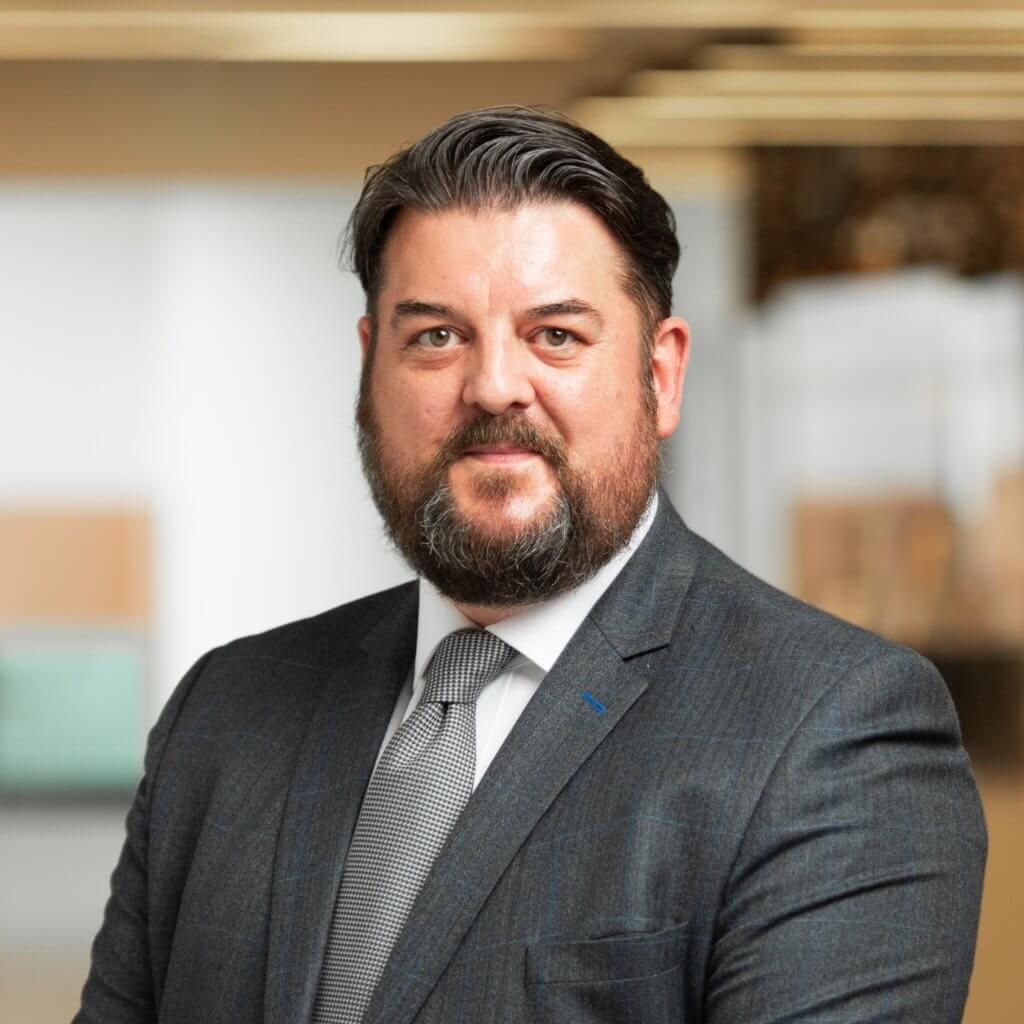
Graham Brown, Manager – Crisis and Response, Petrofac Training Services
Episode 23: Connecting Global Crisis Teams – The Success of Hybrid Crisis Management
Graham es uno de los profesionales con más experiencia en preparación y respuesta ante emergencias del sector del petróleo y el gas del Reino Unido, con más de 30 años de experiencia. Ha prestado apoyo a empresas energéticas en el Reino Unido y en el extranjero, en Malasia. Ha respondido personalmente a unas 100 emergencias reales, entre ellas múltiples accidentes médicos o mortales, incendios y explosiones, vertidos de petróleo, colisiones de buques, evacuación y abandono de instalaciones, abordajes de manifestantes y situaciones con rehenes. Entre una emergencia real y otra, trabaja con un equipo de profesionales con sede en Aberdeen, en el Centro de Servicios de Respuesta a Emergencias de Petrofac, para diseñar e impartir programas de preparación para la gestión de incidentes y crisis a clientes de todo el mundo.
02:47 How would you define what is a professional responder?
05:03 In regards to the pandemic, how has that disrupted business models across all industries and how do you think that specific crisis centres like yours, Petrofac is impacted?
07:35 During the pandemic you took everything from your physial environment in your center and you just virtualized it using tools and technologies such as teams. Perhaps the software solution from F24 as well helped you to achieve it?
08:42 If we want to look at an ultimal crisis responce. Is there a way that you can define it or how would it be set up?
11:37 How does the industry requirements impact your prepadness or the organizations preparedness?
14:20 What have you learned by working in your profession that you may have adopted as a standard working practice either in your personal life or perhaps your professional life?
Episode 24: Responding to Trauma – How Crisis Teams should Train for Trauma Response
Cath Kerr es miembro asociado de la Sociedad Británica de Psicología, psicóloga asesora colegiada y cofundadora de KRTS International. Cath comenzó su carrera en el sector del voluntariado trabajando con personas que habían sufrido violencia doméstica. Desde entonces, se ha especializado en la gestión del impacto psicológico de incidentes críticos, con un máster en trauma psicológico y unos 25 años de experiencia trabajando con organizaciones de alto riesgo y clientes que sufren todo tipo de reacciones a crisis y traumas, desde estrés agudo hasta trastorno de estrés postraumático (TEPT). Su experiencia incluye agresiones graves, violencia sexual, situaciones con rehenes, incidentes con armas de fuego, presenciar actos violentos y la muerte.
03:04 How would you best define what trauma actually is?
04:40 What sort of symptoms should first responders look for while dealing with traumatic or critical signs?
06:21 Some people can get withdrawn, perhaps a little bit quiet, and maybe are not showing the obvious signs. How would you recommend trying to look after those?
07:05 What is the primary function that crisis and trauma responders do and what is the rational behind that?
09:00 What should be the first line of action when dealing with trauma response and why?
11:11 What have you learned by working in your profession that you may have adopted as a standard working practice either in your personal life or perhaps your professional life?

Cath Kerr
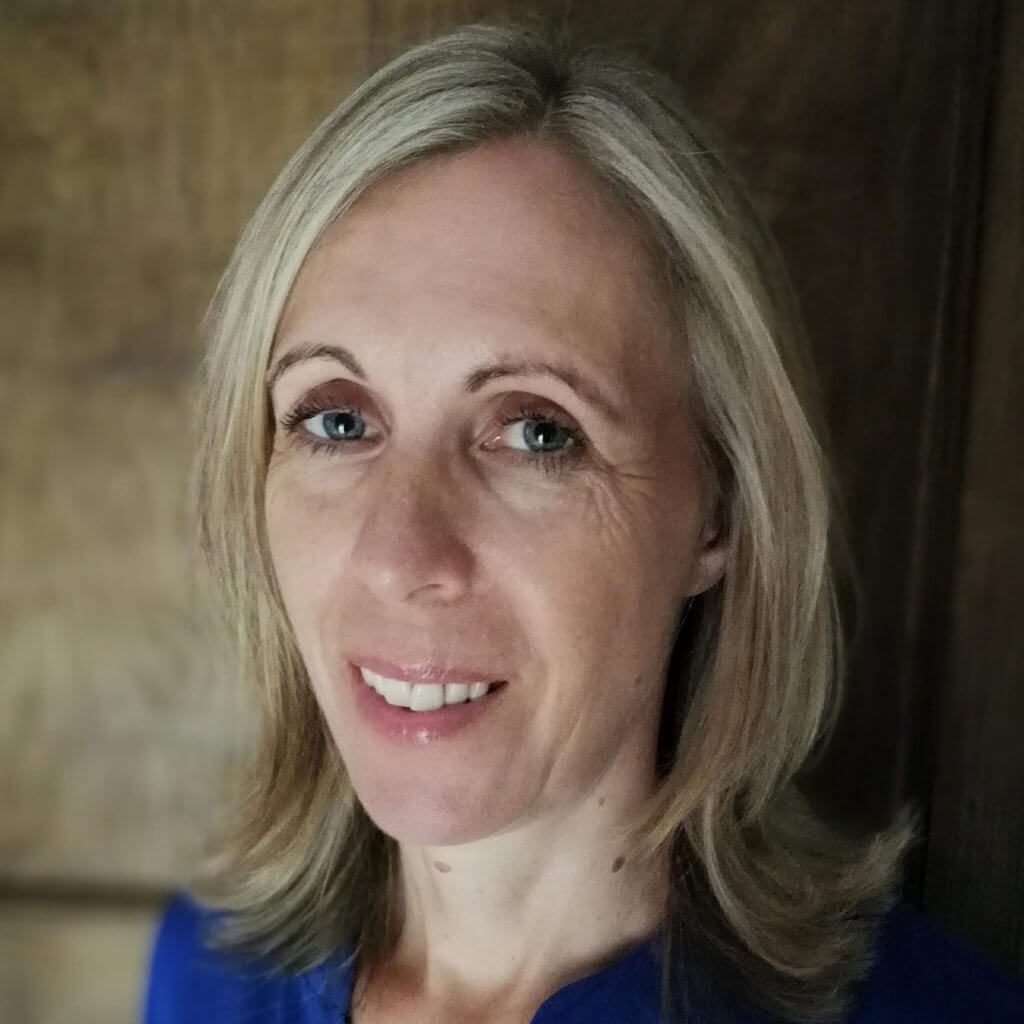
Dr Liz Royle – Director at KRTS International
Episode 25: Responding to Trauma – Part 2- How Crisis Teams should Train for Trauma Responset
En la continuación de nuestro último episodio, en este episodio, nos sumergimos más en la respuesta al trauma – cómo afecta a los que responden al trauma y cómo pueden prepararse mejor para sus funciones. La doctora Liz Royle tiene más de 25 años de experiencia en el campo de la ayuda a las organizaciones para que se preparen estratégicamente y respondan al impacto de las crisis y los traumas en el lugar de trabajo. Como psicoterapeuta experimentada en traumas, Liz también ha trabajado extensamente con clientes que sufren de trastorno de estrés postraumático y reacciones de crisis, incluidas las que se producen después de múltiples muertes, agresiones graves y accidentes, actos de terror y desastres naturales. Fue miembro fundador de la UK Psychological Trauma Society y es autora de numerosas publicaciones internacionales.
Su empresa, KRTS International, ofrece una gama de soluciones digitales galardonadas para gestionar los riesgos que plantean las crisis y los traumas en el lugar de trabajo.
03:13 Why do you think despite having enormous amounts of information available on crisis probabilities is it really difficult for people to talk about crisis preparedness?
06:30 Could you elaborate a little bit more on that psychological impact for the members of crisis management team? What are the signs and symptoms?
10:20 It must be a real challenge for a crisis team in terms of levels of authority. And maybe there is a natural assumption that those leaders will be the ones that are the best coping with the situation but perhaps it is not the case?
10:45 How do you think we should best support the crisis management teams when they are running the operations? What are their additional needs?
12:52 When do you think it is the right time for them to receive that support?
16:04 What have you learned by working in your profession that you may have adopted as a standard working practice either in your personal life or perhaps your professional life?
Episode 26: Geopolitical Issues of of the Western Balkans – How can Businesses prepare for the challenges?
El Dr. Robert Mikac es profesor asociado de Ciencias Políticas, especializado en Ciencias Sociales, en la Universidad de Zagreb. Su carrera comenzó como comandante de una compañía de policía militar, en la que sirvió como teniente primero y se le encomendó la tarea crucial de supervisar y proteger las 24 horas del día, los 7 días de la semana, a la policía militar del Ministerio de Defensa.
La experiencia del Dr. Mikac se extiende a diversos ámbitos, ya que trabajó en la Dirección Nacional Croata de Protección y Rescate como Jefe del Sector de protección civil – Comandante de protección civil de la República de Croacia. También es un reconocido miembro del Consejo de Seguridad Nacional del Presidente de la República de Croacia.
Como académico aclamado, el Dr. Mikac está especializado en una serie de temas, entre ellos las relaciones internacionales, la seguridad internacional y nacional, la gestión de la seguridad, la gestión de crisis y catástrofes, la protección civil, la protección de infraestructuras críticas y la resiliencia, y las migraciones y la seguridad.
02:26: What are the challenges faced by countries in the western Balkans in particular regarding political, economic and security situation?
06:02: In your opinion which of those is the main challenge in particular looking at geopolitical tensions and how this can be taken into account when discussing how organisations can do business in the area and be more prepared?
10:02: Would there be a tendency for these organisations to align to European or the international standards?
11:23: How do you see the current conflict in the Ukraine? How does that affect political and security situation in the western Balkans?
14:03: What is the median term perspective on the political,economic and security measures. What sort of the future opportunities should be considered when taking this into consideration?
16:21: What have you learned by working in your profession that you may have adopted as a standard working practice either in your personal life or perhaps your professional life?
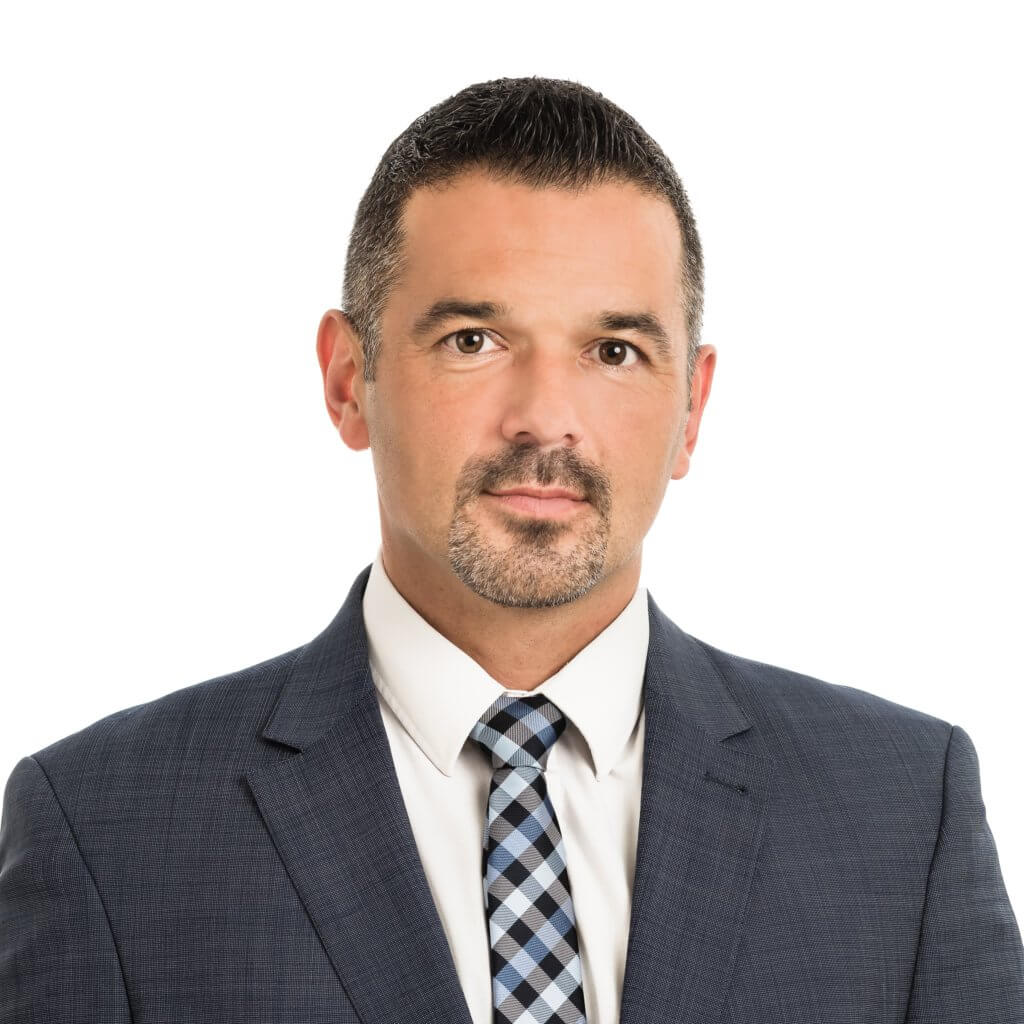
CPhD Robert Mikac
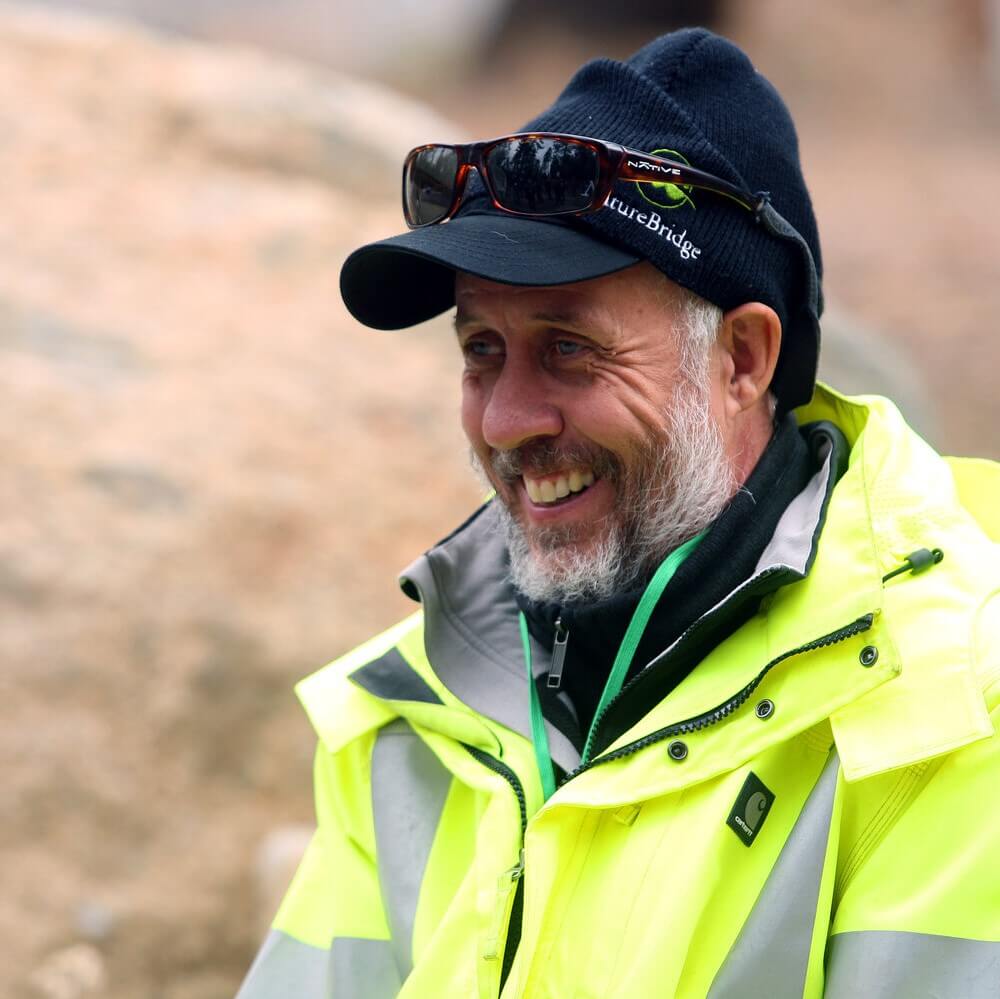
Moose Mutlow
Episode 27: Compassion in Crisis – Understanding the Psychological Dimensions of Emergencies
Moose cuenta con casi cuatro décadas de experiencia en educación tradicional y alternativa en todo el mundo. Ha dirigido cursos de formación de instructores de Outward Bound de 58 días de duración en los Apalaches, ha sido subdirector en el desierto de Kalahari, ha gestionado una concesión de playa en el Mediterráneo, ha atravesado selvas tropicales australianas con estudiantes de secundaria, ha impartido más de 2000 días de instrucción sobre el terreno en un entorno salvaje y recientemente ha vuelto de impartir un programa de piragüismo para veteranos en el Golfo de México.
Desde 2002 Moose ha sido miembro y formador principal de Yosemite Search and Rescue, trabajando como técnico y dentro del Mando de Incidentes, en una de las operaciones SAR más concurridas del mundo.
Actualmente, Moose trabaja para NatureBridge en el Parque Nacional de Yosemite como Director Senior de Proyectos para la planificación, diseño y construcción del Centro Nacional de Ciencias Medioambientales.
Moose ha sido el Formador Principal de los Oficiales de Enlace Familiar para el Servicio de Parques Nacionales impartiendo formaciones con personal de los Parques Nacionales de Yosemite, Arches, Smokey Mountains, Olympic, Rocky Mountain, Theodore Roosevelt, Joshua Tree, Sequoia Kings, Point Reyes, Lassen, Teton y Yellowstone.
02:59 Can you tell our audience a little bit more about all that you do for family liaison support and in particular rescue operations?
04:10 In terms of defining that emergency because it can be relative from one person´s emergency to another person´s emergency. What would you define as a full search and rescue operation emergency?
05:08 And managing those emergency situations would you be fair to say that you try to direct and steer the situation as best you can without it escalating into a broader ineherent drama and more critical situation?
06:25 What do you think families need when they face a crisis in the resulting trauma?
08:02 You talked a lot about distress continium in your work. Can you elaborate a little bit further in terms of the context of that in the psychological first aid?
12:01 What have you learned by working in your profession that you may have adopted as a standard working practice either in your personal life or perhaps your professional life?
Episode 28: 2023 Summer Special Episode
Con la mitad del año ya transcurrida y el verano en pleno apogeo, ¡es hora de hacer un poco de retrospección! Le damos la bienvenida a este episodio especial en el que abordamos una pregunta muy especial: “¿Qué ha aprendido en su profesión que pueda haber adoptado en su propia práctica laboral habitual o en su vida personal?”.
Conéctate para escuchar las profundas enseñanzas que nuestros ponentes invitados han extraído de su profesión y que han dado forma a sus vidas.
En este episodio:
00:15 Alessandro Lazari, Senior Key Account Manager, F24 AG
02:24 Graham Brown, Manager – Crisis and Response, Petrofac Training Services
05:28 Cath Kerr, associate fellow of the British Psychological society, a charted counseling psychologist, cofounder of KRTS international
06:40 Dr Liz Royle – Director at KRTS International
08:55 PhD Robert Mikac, Associate Professor in the field of Political Science, International author
10:20 Moose Mutlow – Family Liaison Officer trainer, Swiftwater Rescue practitioner and author
11:26 Heidi Snow, Founder / CEO – AirCraft Casualty Emotional Support Services (ACCESS)
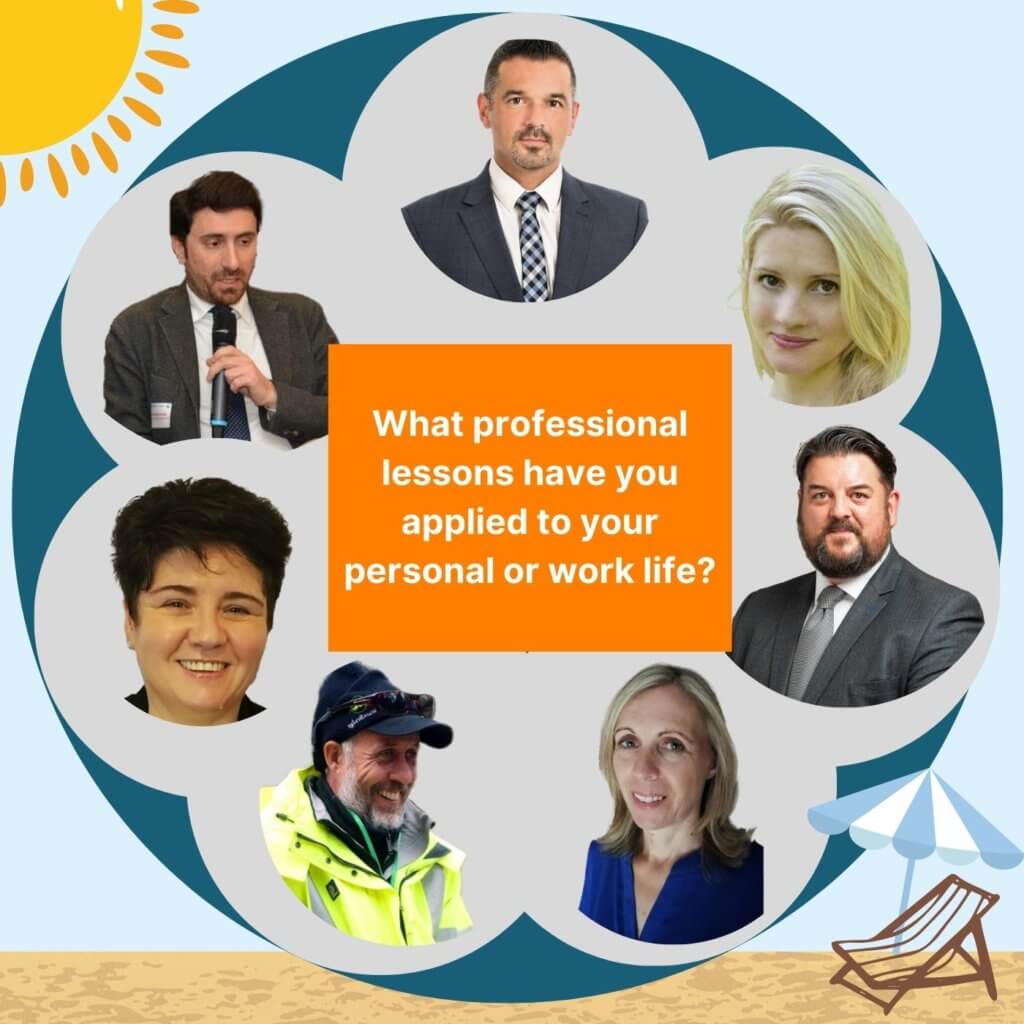
CPhD Robert Mikac

Stefanie Hach, Head of Sales & Marketing, F24 Luxembourg
Episode 29: Top Trends in Cyber Security – And How the Field can Grow
Stefanie Hach trabaja para F24 Luxemburgo. Tiene un máster en Gestión de Empresas por la European Business School y experiencia en consultoría empresarial de servicios digitales, en la que ha trabajado con muchas de las 500 empresas más afortunadas. Stefanie se unió a F24 en 2017 y desde entonces ha aprendido su oficio en la gestión de crisis al lado del fundador de F24 Christian Götz. Stefanie dirige el equipo comercial de F24 Luxemburgo y es responsable de establecer y dirigir todas las actividades de ventas y marketing en Luxemburgo y también en los Países Bajos. Stefanie también es miembro del consejo de Womens Cyber Force, una ong que apoya a las mujeres en la industria tecnológica y cuyo objetivo es aumentar la presencia femenina en el campo de la cibernética.
02:21 What are the top trends in cyber risk for the next few years ahead?
03:45 And in regards to the growing trend of internet of things – So if we combine it with the cybersecurity, is it something we need to have a closer look at?
05:50 Why is the female presence in cybersecurity so little today?
07:48 Do you think the cybersecurity industry needs a change for women to become more engaged within opportunities?
08:50 What have you learned by working in your profession that you may have adopted as a standard working practice either in your personal life or perhaps your professional life?
Episode 30: Alerting everywhere, at any time: Emergency Warning Service
En este episodio nos acompañan dos destacados expertos, Amelie Grangeat y Laurent Arzel, que nos hablarán de cómo el EWSS está revolucionando nuestra forma de responder a las emergencias aprovechando el poder de la tecnología por satélite. Amelie es Directora de Producto de F24 y experta en sistemas de alerta pública. También ha aparecido anteriormente en nuestro podcast. En esta ocasión conversa con Laurent Arzel, Jefe del Proyecto de Navegación de TELESPAZIO. Escúchelos hablar sobre cómo la tecnología está haciendo que el Sistema de Alerta Pública sea más eficaz para cubrir todo tipo de escenarios de crisis.
03:46 Could you please present the Galileo constellation and the GNSS signal ?
06:26 Is this Galileo signal compatible with all smartphones in Europe ?
10:15 Could you please present the Stellar project, its objectives and the consortium ?
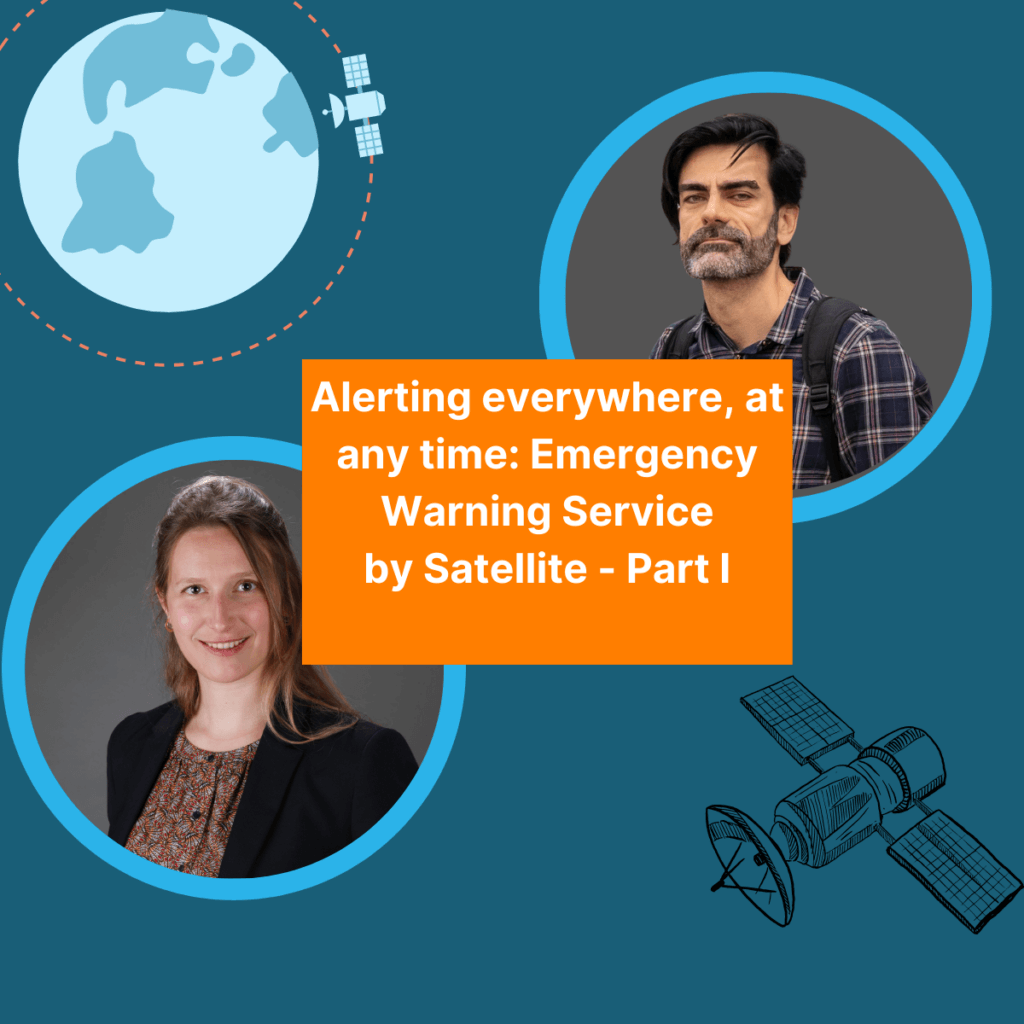
Amélie Grangeat, Senior Product Manager and Expert on public warning systems at F24 & Laurent Arzel, Navigation Project Leader, TELESPAZIO
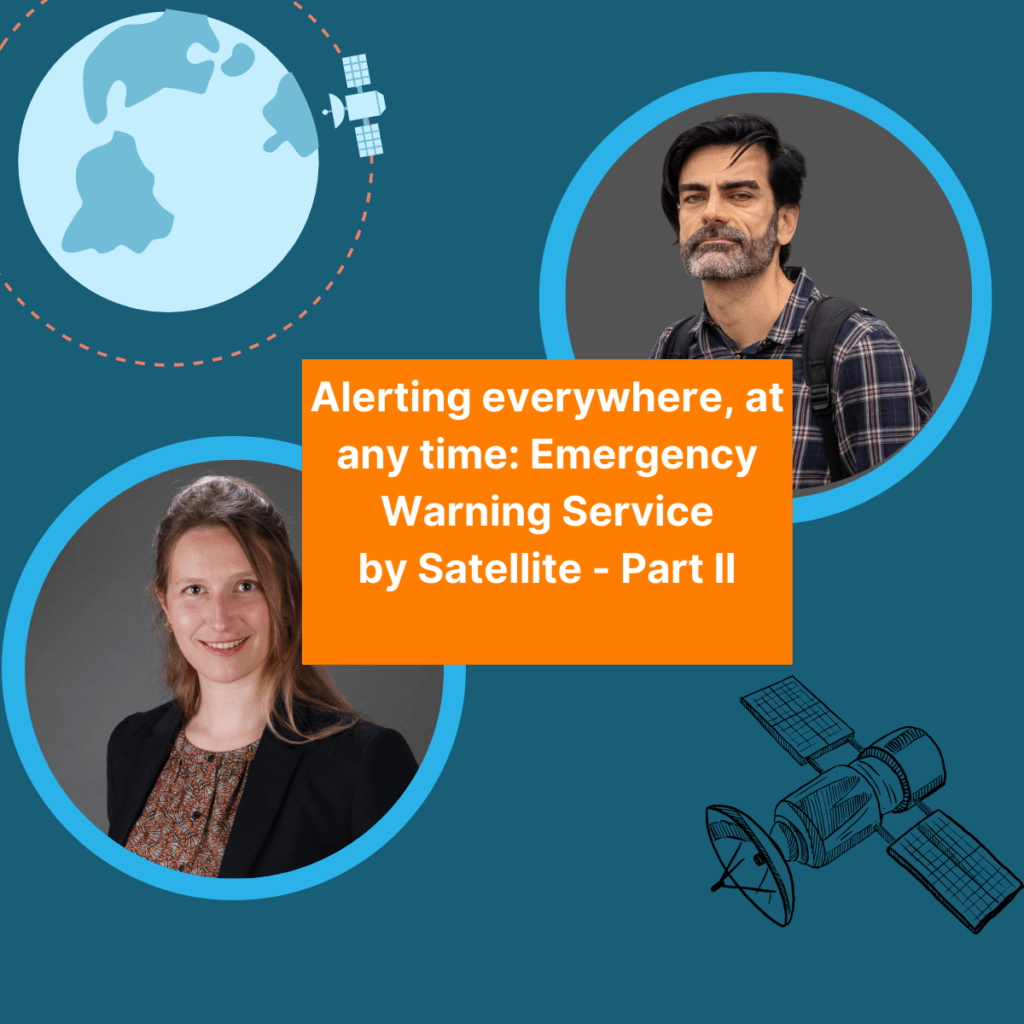
Amélie Grangeat, Senior Product Manager and Expert on public warning systems at F24 & Laurent Arzel, Navigation Project Leader, TELESPAZIO
Episode 31: Alerting everywhere, at any time: Emergency Warning Service
En este episodio nos acompañan dos destacados expertos, Amelie Grangeat y Laurent Arzel, que nos hablarán de cómo el EWSS está revolucionando nuestra forma de responder a las emergencias aprovechando el poder de la tecnología por satélite. Amelie es Directora de Producto de F24 y experta en sistemas de alerta pública. También ha aparecido anteriormente en nuestro podcast. En esta ocasión conversa con Laurent Arzel, Jefe del Proyecto de Navegación de TELESPAZIO. Escúchelos hablar sobre cómo la tecnología está haciendo que el Sistema de Alerta Pública sea más eficaz para cubrir todo tipo de escenarios de crisis.
08:42 What are the next steps/obstacles to remove so that this project goes live ?
10:38 What have you learned by working in your profession that you may have adopted as a standard working practice either in your personal life or perhaps your professional life?
Episode 32: Navigating the Supply Chain Act- Key Considerations for Business Compliance
En este episodio, nos acompaña el Dr. Roland Pulfer, un experimentado empresario con más de 30 años de experiencia y centrado en la gobernanza, el riesgo y el cumplimiento normativo. El episodio gira en torno a la Ley de la Cadena de Suministro, un reto normativo para numerosas empresas. Roland arroja luz sobre su alcance global, las importantes implicaciones para las empresas, así como los retos que pueden surgir, como por ejemplo las cadenas de suministro complejas, las limitaciones de recursos dentro de las empresas y la necesidad de una diligencia debida exhaustiva.
02:09 Compared to other regulations of the past, how do you see the EU Supply Chain Act? What are its implications and requirements?
04:47 Which companies fall in the scope of the Supply Chain Act? What are the impacts on international companies?
08:15 What are the practical consequences for businesses?
10:45 What obstacles may arise for businesses during the implementation of these guidelines?
13:15 What advice would you give to companies obliged to comply with the Supply Chain Act?
14:40 What have you learned by working in your profession that you may have adopted as a standard practice either in your personal life or perhaps your professional life?

Guest Speaker: Dr. Roland Pulfer, Founder of Business-DNA Solutions GmbH and GRC Expert
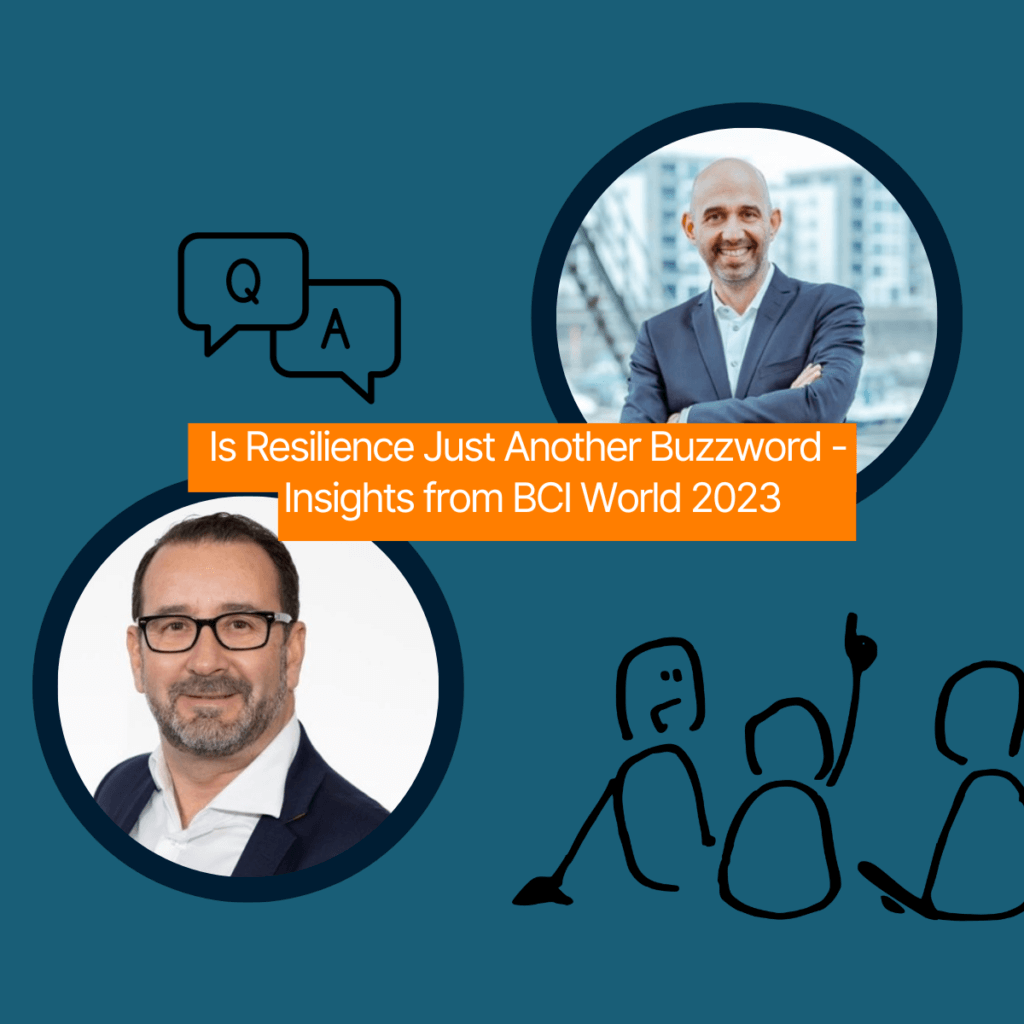
Markus Epner & John Davison
Episode 33: Is Resilience Just Another Buzzword – Insights from BCI World 2023-Part I
John conversa con:
Markus Epner, Director de la Academia de F24 AG. Markus posee una amplia experiencia en seguridad y gestión de crisis. Sirvió como oficial de las Fuerzas Especiales durante las guerras de Bosnia y Kosovo y trabajó en puestos directivos en el sector empresarial durante más de dos décadas, principalmente en Lufthansa y Boehringer Ingelheim. Markus es licenciado en Seguridad y Gestión de Crisis por la Universidad de Kiel y en Estudios de Seguridad y Crisis por la Escuela Superior de Administración Policial de Schleswig-Holstein.
5:01 People were really interested in holistic software solutions
08:55 There’s a hurricane that’s come over the BCI world which no longer talks about Business Continuity but about Resilience
10:57 Innovation Resilience, that is a term I have never heard before – where you are continuously inovating
15: 30 There’s this fear that Resilience is hardly attracting attention anymore because it’s so overused
Episode 34: Is Resilience Just Another Buzzword – Insights from BCI World 2023 – Part II
John conversa con:
Markus Epner, Director de la Academia de F24 AG. Markus posee una amplia experiencia en seguridad y gestión de crisis. Sirvió como oficial de las Fuerzas Especiales durante las guerras de Bosnia y Kosovo y trabajó en puestos directivos en el sector empresarial durante más de dos décadas, principalmente en Lufthansa y Boehringer Ingelheim. Markus es licenciado en Seguridad y Gestión de Crisis por la Universidad de Kiel y en Estudios de Seguridad y Crisis por la Escuela Superior de Administración Policial de Schleswig-Holstein
1:14 In the past we had every few years one crisis, then we had polycrisis… and now we are in the era of primacrisis
4:23 Markus, what’s your view of what’s the future of Resilience?
8:15 It’s so ridiculous that 50 years after tthe crisis scenario of Apollo 13, people still think that they have to manage crisis with pen and paper
11:52 Technology increases the ability for collaboration for different divisions in an organisations or different disciplines

Markus Epner & John Davison
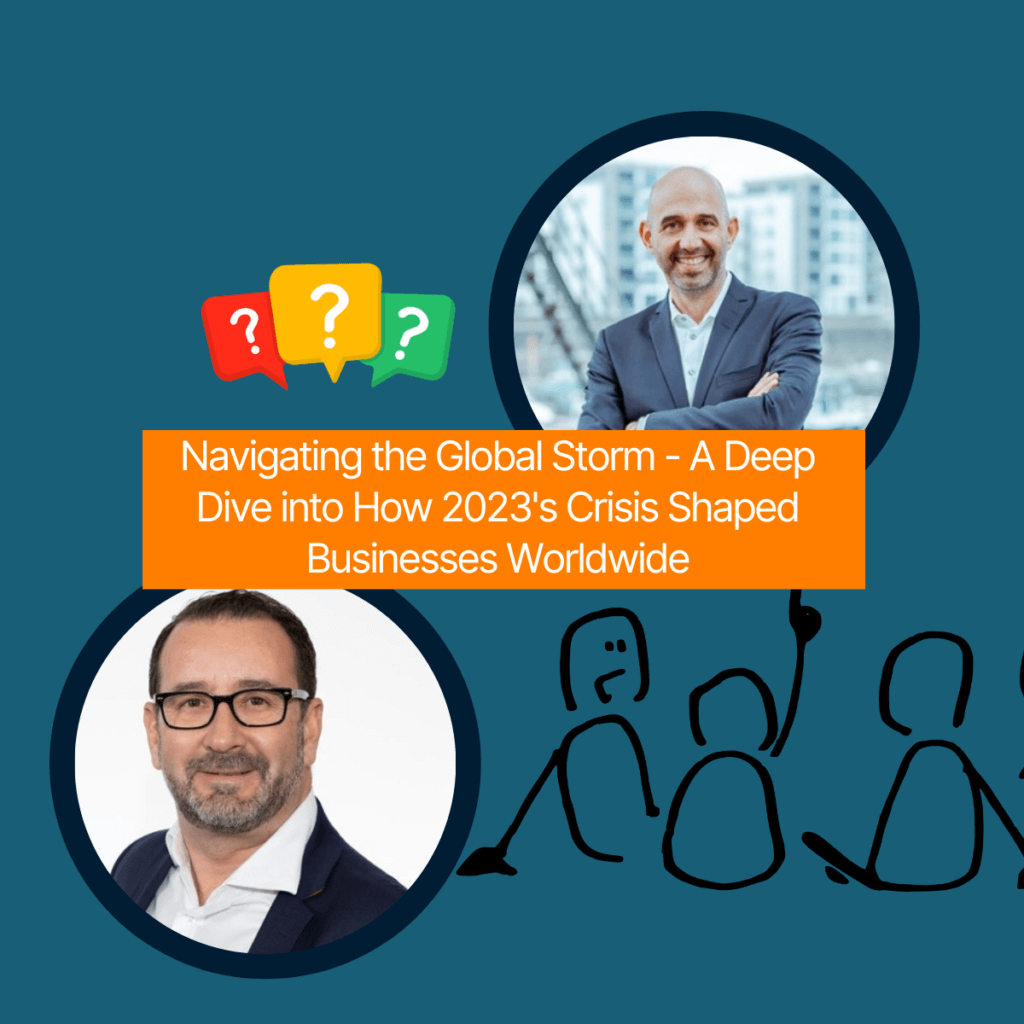
Markus Epner & John Davison
Episode 35: Navigating the Global Storm – A Deep Dive into How 2023’s Crisis Shaped Businesses Worldwide
John conversa con:
Markus Epner, Director de la Academia de F24 AG. Markus posee una amplia experiencia en seguridad y gestión de crisis. Sirvió como oficial de las Fuerzas Especiales durante las guerras de Bosnia y Kosovo y trabajó en puestos directivos en el sector empresarial durante más de dos décadas, principalmente en Lufthansa y Boehringer Ingelheim. Markus es licenciado en Seguridad y Gestión de Crisis por la Universidad de Kiel y en Estudios de Seguridad y Crisis por la Escuela Superior de Administración Policial de Schleswig-Holstein
3:00 Not everyone is aware of the Bow-Tie method of risk Analysis
4:12 How much crisis management knowledge should a company have to call itself Crisis ready
10:03 Because it is our last podcast of the year, it’s worth taking a look at the year so far… what has been the most important events this year for you Markus?
17:30 According to the European Climate Monitoring System, 2023 will be the hottest year on record. Last month broke the previous November heat record and increased the global average temperature to 1.46°C
21:53 Experiences from the CSO 360 in Berlin, and ASIS Finland
Episode 36: Cybersecurity in the Courtroom – Legal Challenges in the Digital Realm
En el episodio especial de hoy, Nadia Schaff y Daniel Wildmann, ambos del bufete internacional Pinsent Masons, abordarán las consecuencias jurídicas de la gestión de crisis relacionadas con la cibernética. Nadia Schaff asesora a clientes alemanes e internacionales sobre la aplicación de los requisitos de protección y seguridad de datos, especialmente en relación con incidentes cibernéticos. Además, Nadia asesora en temas de comercio electrónico, lo que implica apoyar a los clientes en la planificación e implementación de proyectos de TI, así como en la redacción y negociación de acuerdos de licencia de software relacionados. Daniel asesora a empresas nacionales e internacionales en transformación digital apoyándolas a lo largo de todo el viaje, desde la digitalización de los procesos de negocio hasta la implementación de nuevas tecnologías como la nube o los servicios blockchain. Gran parte del trabajo de Daniel consiste en asesorar a los clientes sobre la aplicación y el cumplimiento de los requisitos de protección y seguridad de datos, así como en la gestión de incidentes cibernéticos.
03:05: When it comes to cyber related crisis incidents, there are several repurcussions that one must consider from a legal perspective. Can you share with us what those considerations are?
05:33 How would you typically expect organizations to fulfil that communication to these third parties?
07:10 In regards to the primary stakeholders, who else needs to be identified in such a crisis?
09:26 How do you think companies can prepare to comply with NIS2 and what are the legal anticipations?
13:26 What about those international organizations that operate beyond the EU and across multiple borders, how does data protection and GDPR applicability take consideration?
16:23 How can clients develop crisis management plans that address the notification obligations across this multiple states and jurisdictions while minimizing the potential conflicts of interest or legal obligations or challenges?
20:28: What have you learned by working in your profession that you may have adopted as a standard working practice either in your personal life or perhaps your professional life?
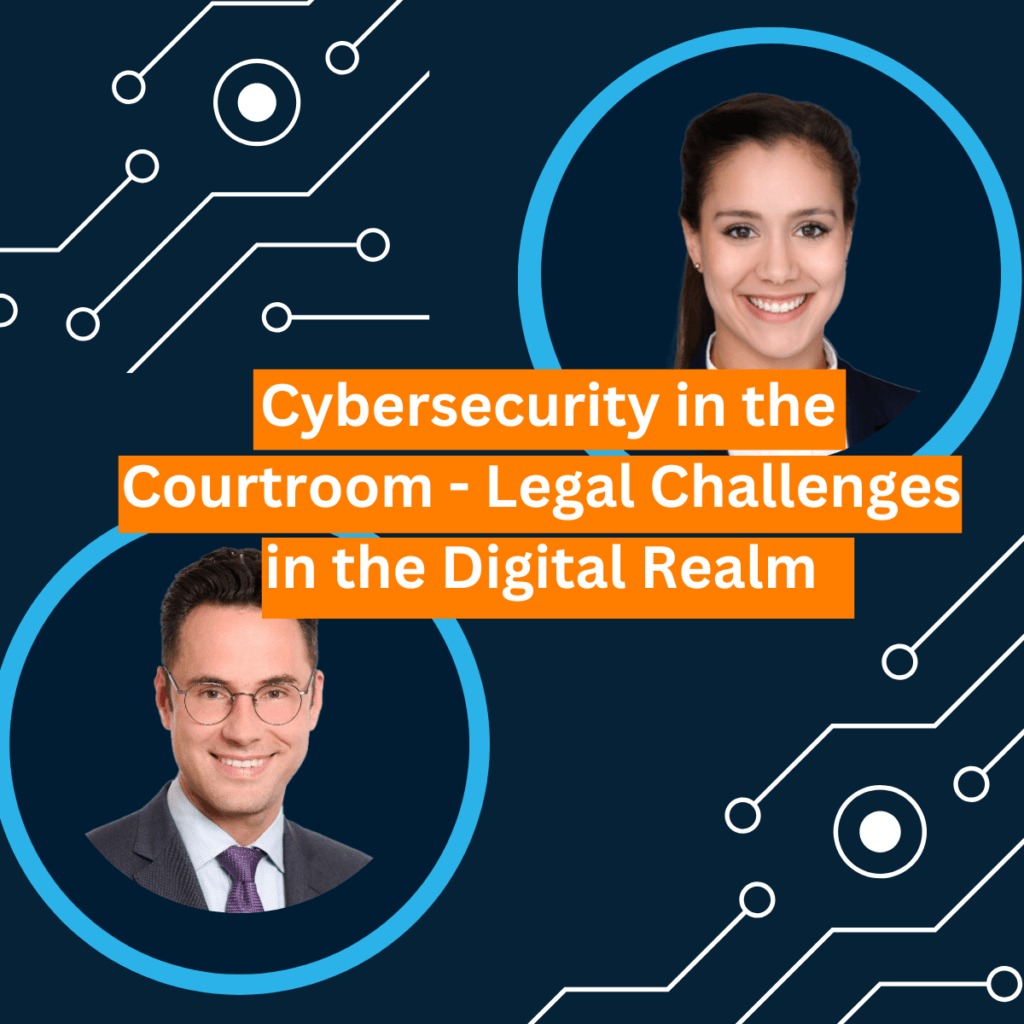
Daniel Widmann & Nadia Schaff
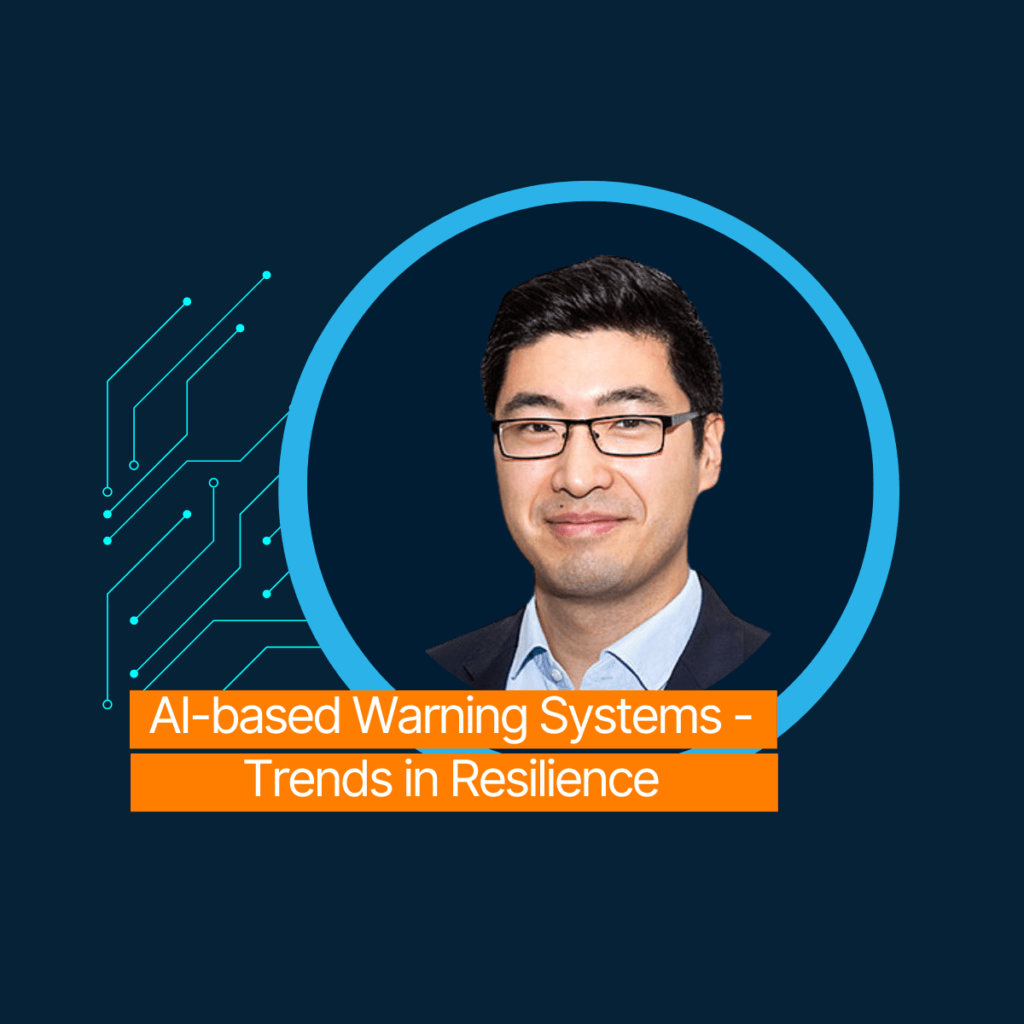
Jackie Ma
Episode 37: AI-based Warning Systems – Trends in Resilience
Jackie Ma es una consumada matemática e investigadora especializada en aprendizaje automático aplicado. Obtuvo sus títulos de Máster y Dr. rer. nat. en la Universidad Técnica de Berlín. Durante su trayectoria académica, ocupó puestos de investigador visitante en la ETH de Zúrich, la Universidad de Cambridge y la Universidad de Hong Kong. En 2017, se incorporó al Instituto Fraunhofer de Telecomunicaciones-Instituto Heinrich Hertz, donde actualmente desempeña el cargo de jefe del Grupo de Aprendizaje Automático Aplicado.
En la actualidad, dirige un proyecto sobre Inteligencia Artificial, encargado por el Ministerio Federal de Economía y Acción por el Clima de Alemania. Su equipo también dirige varios proyectos financiados por el Gobierno que exploran las posibilidades de la inteligencia artificial en los ámbitos de la gestión de catástrofes naturales, la sanidad y los asuntos climáticos, entre otros.
02:32 You have been working on a project that is funded by the German Ministry for Economics and Climate Affairs where you are building an early warning system to support the German economy. Can you please tell us about the role of AI in this project – how AI can help?
04:54 How does this model cater to specific industries or industry specific needs?
06:59 What do think are the opportunities and challenges of an AI based warning system?
09:20 So it looks like AI is going to have a significant role in the Resilience industry – could you please tell us a bit about the current trends and what we can expect in the near future?
11:20 What have you learned by working in your profession that you may have adopted as a standard working practice either in your personal life or perhaps your professional life?
Episode 38: Editing the Narrative – Wikipedia’s Role in Managing Brand Reputation
Rhianon Ruff tiene más de 10 años de experiencia ayudando a empresas de Fortune 100 a navegar por Wikipedia. Rhi ha colaborado con agencias digitales boutique durante ese tiempo, trabajando con innumerables marcas y líderes empresariales para actualizar sus entradas de Wikipedia de acuerdo con las normas y directrices del sitio. Mientras colaboraba con sus clientes, se dio cuenta de que existía un gran desconocimiento sobre el papel fundamental de Wikipedia a la hora de salvaguardar la reputación digital de las marcas. En consecuencia, ha tomado medidas proactivas para aumentar la concienciación sobre este tema crucial, canalizando su experiencia en la oferta de libros perspicaces y dando charlas atractivas en diversas plataformas.
Traducción realizada con la versión gratuita del traductor DeepL.com
02:30 Rhi, you are an expert who advises companies on working with Wikipedia. Can you tell our audience a bit about how Wikipedia fits into the scheme of crisis communication?
06:02 What are the common mistakes that you see crisis communication professionals frequently committing when handing Wikipedia?
09:37 I guess a natural follow up of my last question would be – what are the best practices that communication professionals need to adhere to while handling Wikipedia especially in case of a crisis?
12:54 To sum it up, what do you think businesses are missing out on if they don’t include Wikipedia in their crisis management process and what’s a good place to start?
15:58 What have you learnt by working in your profession that you may have adopted as a standard working practice either in your personal life or perhaps your professional life?

Rhianon Ruff
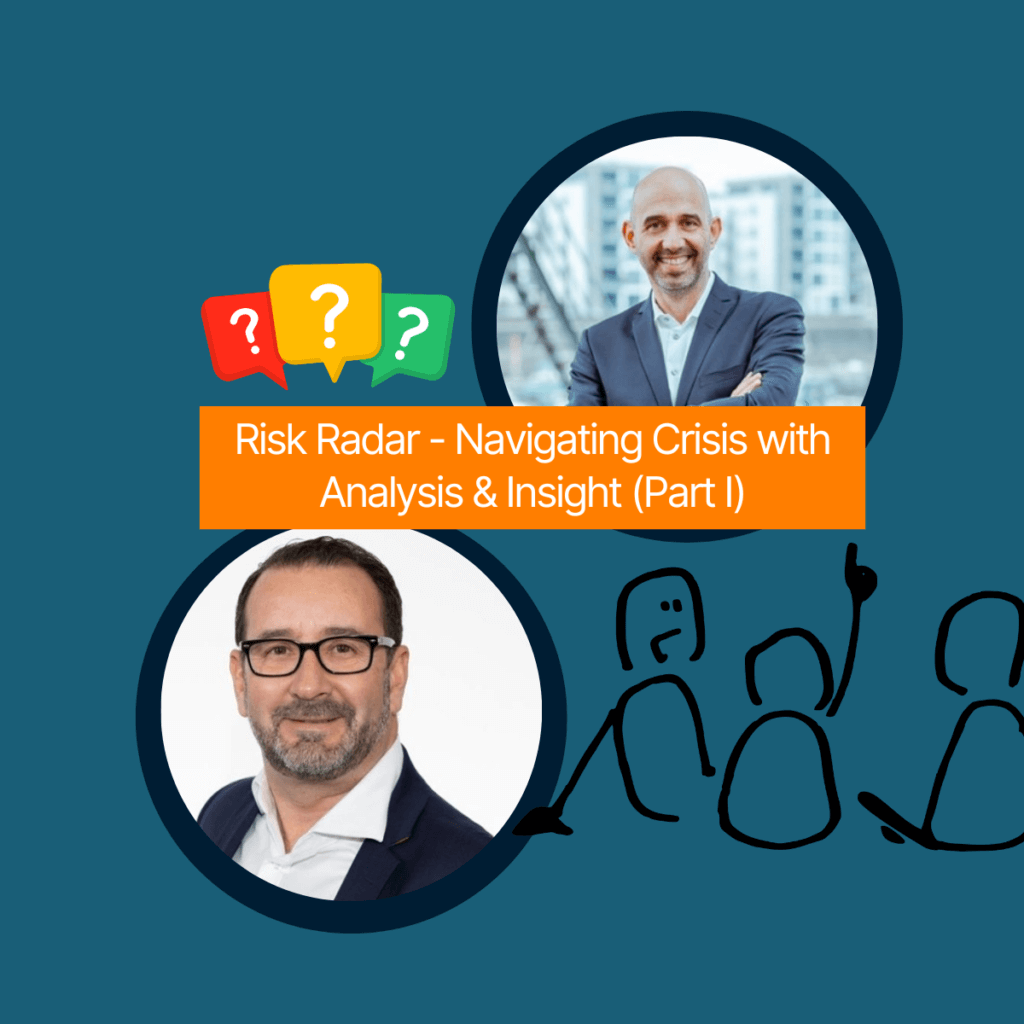
Markus Epner & John Davison
Episode 39: Risk Radar – Navigating Crisis with Analysis & Insight (Part I)
En este episodio, John vuelve a conversar con:
Markus Epner, Director de la Academia de F24 AG. Markus posee una amplia experiencia en seguridad y gestión de crisis. Sirvió como oficial de las Fuerzas Especiales durante las guerras de Bosnia y Kosovo y trabajó en puestos directivos en el sector empresarial durante más de dos décadas, principalmente en Lufthansa y Boehringer Ingelheim. Markus es licenciado en Seguridad y Gestión de Crisis por la Universidad de Kiel y en Estudios de Seguridad y Crisis por la Escuela Superior de Administración Policial de Schleswig-Holstein.
03:00 Why should a resilience manager or a crisis manager who has already a hundred hours of overtime, dealing with severe challenges round the clock read a risk report or even several risk reports?
05:29 I am curious Markus, shifting through the mountain of pages, which risk reports have you been pouring over and why are they important?
08:30 These reports help us flex our decision making skills and fortify our organisation’s resilience
10:24 Cyber security and data protection will take centre stage as will the importance of talent management and climate change adaptions, supply chain risks and the need for a fliexible holistic risk management strategy
15:05 That’s really impressive example of how regional conflict can have a global impact across continents